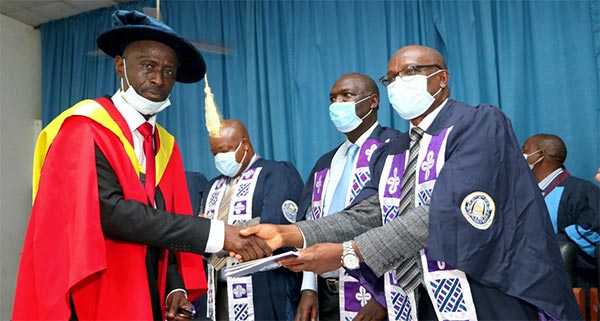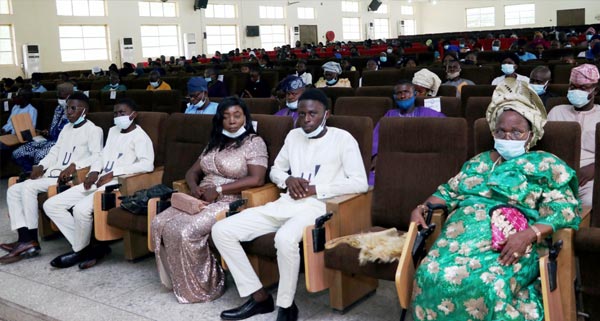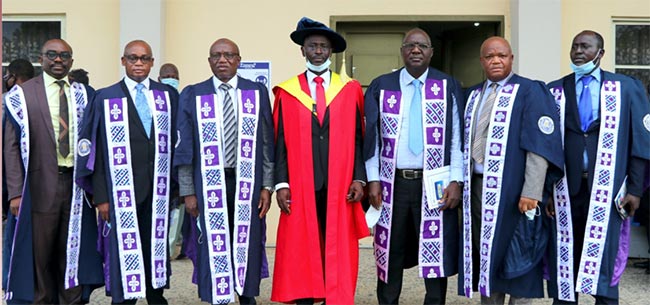A Professor of Mycology and Head of Department of Microbiology, Olabisi Onabanjo University (OOU), Ago-Iwoye, Prof. Samuel Adegoke Bankole, has decried how Nigeria and many African nations had failed to place much value on research but only interested in technology transfer from developed countries. The don, who described research as a powerful tool for innovations and progress, said African governments must change their attitude in retooling the continent for improvement.
He also canvassed for the establishment of functional mycological culture collection centres in the country to serve as depository and facilitate research on mycology which is a branch of biology concerned with the study of fungi. He noted that much of the academic researches done in mycology as well as other areas of science do not get to relevant industrial research and business development activities. He, therefore, stressed the need to evolve mechanisms to promote knowledge sharing and transfer between those sectors in order for Nigeria to realise the potential that scientific research offers.

Prof. Bankole made the call while delivering the 96th Inaugural Lecture of OOU on Tuesday, 15th June, 2021 at the Otunba Gbenga Daniel Lecture Theatre, Main Campus, Ago-Iwoye.
The Lecture entitled, “FUNGI: MAN’S COMPANIONS OR ADVERSARIES?” was presided over by the Vice-Chancellor of the University, Professor Ganiyu Olatunji Olatunde.
At the event, the distinguished scholar disclosed that fungi are of utmost importance in all fields of human endeavours and they have both good and bad sides. According to him, fungi inhabit every ecological niche and the biosphere and biodiversity would not have been complete without them.
While explaining that fungi exhibit astounding diversity and variations in terms of the environments where they live and the types of interaction with other organisms, Prof. Bankole pointed out that overwhelming majority of fungal species remain undescribed. In fact, he revealed that less than 10 percent of fungal biodiversity has been identified.
The Inaugural Lecturer asserted that fungi have profound influence on biodiversity, agriculture, manufacturing, health, ecology and biological research, adding that fungi may be the key to finding innovative ways to build a sustainable planet and understand human relationship with the planet.
He said, “Fungi are the second largest organisms next to insects, and it is quite challenging to obtain the total inventory of fungi on the planet. The most recent estimate using molecular phylogeny and culture-independent methods put fungal diversity at 12 million species. However, only about 120,000 species of fungi have been described so far. This makes fungi one of the earth’s biodiversity that have been least explored.
Mycologists have continued to describe fungi new to science at the rate of about 1,000 species every year, implying that the description of new fungal species would continue for the next 10,000 years with the estimated 12 million species diversity.

In the eyes of many, fungi connote dirt and diseases, poisons, demons, and enemy of humans that should not be seen or touched, while others view them as a two-edged sword that could be life enhancers as well as being destroyers. It is not practicable for man to live in an environment free of fungi as they form part of our daily life, though, man often fail to realize their presence.”
Prof. Bankole stated that it was important for OOU to provide modern equipment and trainings for molecular studies of fungi. “Just as we have the herbarium for those in botany and zoological garden for those in zoology, there should be a mini culture collection centre in the University to keep microbial cultures alive under freezing and regular propagation for the purpose of teaching and research,” he added.
The erudite academic further called for the establishment of Nigerian Institute of Mycological Studies/Research to serve as reference for the surveillance, data collection, monitoring, and documentation of outbreak of fungal diseases in the country. He posited that the Institute’s mandate should include the provision of expert advice and assistance to governments and the general public on various aspects of practical from food spoilage, poisonings to resolution of civil/criminal cases.
“In advanced countries, such institutes are also patronized by the police in criminal and civil investigations,” he submitted.
The Inaugural Lecturer urged governments in African countries to emulate countries like Germany by investing huge resources in research. He faulted the preference for technology transfer from advanced nations at the expense of interest in homegrown research.
“African governments if truly are committed to retooling the continent for progress should borrow a leave from a country such as Germany, which in the wake of economic recession in 2009 deliberately increased the budget for research. I am aware that TETFUND is doing a lot to improve the research landscape in Nigerian universities, but there is still room for improvement. In developed countries, the governments and even the private sectors commission research. This is an area that government and TETFUND could consider because this probably is the way by which basic fungal research such as describing new species of fungi could attract grants,” he said.
Since there are teeming populations of fungi that have not been identified and explored in all regions of the world, particularly in tropical Africa which is believed to be richer in fungal biodiversity, the professor contended that there was need to recruit and attract more researchers into the field. According to him, there is a paucity of researchers with multidisciplinary expertise in fungal molecular biology and biotechnology.

Prof. Bankole further averred: “There is a need for better mycology training especially at the postgraduate level to foster improved knowledge and realise the potential that fungal biology offers. There could be incentives in form of scholarships and bursaries to pursue courses in Mycology from time to time. Training of more young scientists with passion and interest in multidisciplinary fungal research will create an unparalleled environment for the identification of new species of fungi and the developments of new drugs and new technological applications.
If we do not discover new fungi, we would not know what we are missing considering the fact that these yet to be explored fungi could be the sources of new pharmaceuticals, new compounds of industrial importance or new fungi that will exhibit better synergistic roles in support of plant growth and health.”
The don recommended that mitigation strategies against mycotoxins should involve the entire food value chain—from farms to storage methods, traders, consumers, industries and relevant government regulatory bodies.
He added: “The adoption of good pre- and post-harvest management practices such as planting resistant crops, good agricultural practices, improved storage and biocontrol, the practice of leaving grains to dry in the field after physiological maturity promote mycotoxin contamination. Thus, farmers should devise means of rapidly drying their harvest after maturity.
Farmers should harvest their grains promptly and should be taught on the scientific methods of storage. Unfortunately, there were complaints on the quality of grains that were withdrawn from the nation’s grain reserves and distributed to people as COVID-19 palliatives.This implying that there are even problems with storage silos constructed by government which ought not to be so.
There is the need for education of farmers, traders and consumers on the mycotoxin risk in improperly stored foods and the adoption of simple procedures such as hand sorting and washing of grains, whereby the poor quality grains float, and could be removed at the household level. These two steps have been proven to remove not less than 50% of aflatoxin in contaminated samples. For industries, optical sorting and dry milling of grains would be the ideal methods to reduce mycotoxin levels.”
The Inaugural Lecture had in attendance members of the University Management, distinguished scholars, traditional rulers and chiefs, eminent personalities, staff and students.

